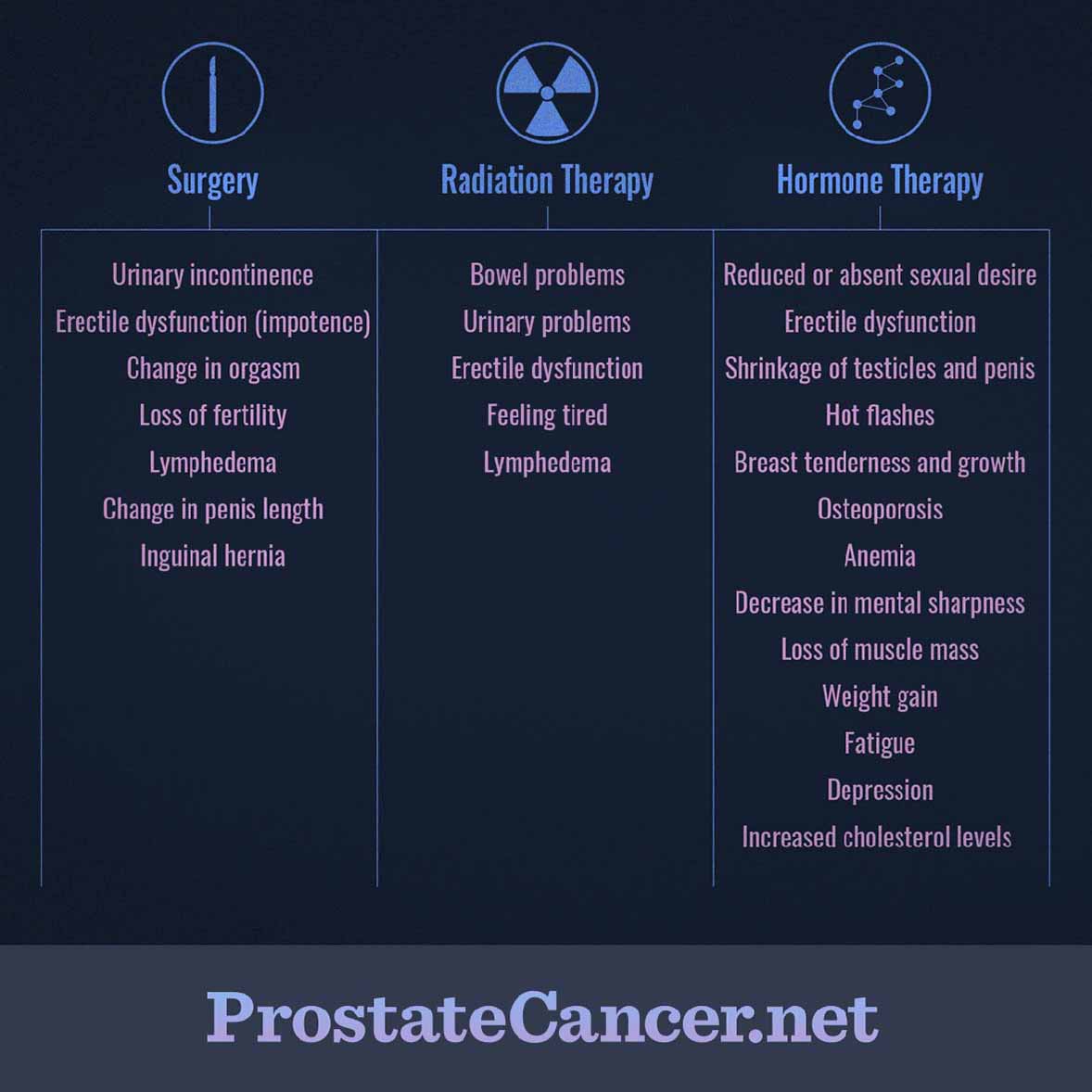Coping with Side Effects of Prostate Cancer Treatment
Reviewed by: HU Medical Review Board | Last reviewed: November 2017 | Last updated: May 2025
Although many cases of prostate cancer are able to be successfully treated, the long-term side effects of many treatments can sometimes be debilitating. Every treatment option carries with it a different set of potential side effects and a different risk of developing these issues. Your healthcare team can help you determine what side effects may be most likely to accompany the various treatment options you discuss as part of developing your treatment plan.
What are the possible treatment side effects?
If you are particularly concerned about a specific side effect and communicate this to your doctor, they may be able to recommend a different treatment option with less of a risk of developing that side effect. If possible, they may even be able to recommend a treatment option that avoids the potential of developing that side effect altogether. Common side effects of treatment that can impact your quality of life are listed by treatment type in the table below:
Figure 1. Side effects of primary treatment options
This is not an exhaustive list of all potential treatment-related side effects that can impact quality of life. If you’re experiencing something not on this list that is impairing your overall wellbeing, seek medical attention as soon as possible. Common ways to manage some of these side effects are outlined below.
Medications and procedures for prostate cancer side effects
Certain quality of life impacting side effects, including erectile dysfunction, some urinary problems, hot flashes, depression, and anxiety, may be able to be managed using medications. Additionally, erectile dysfunction may be further managed by mechanical devices such as penile rings or vacuum pumps. Surgical procedures may also be an option for erectile dysfunction or certain urinary issues. Not all medications, medical devices, or procedures will be applicable or appropriate for everyone. Your healthcare team will help you determine if you are a candidate for any of these treatment options.
Lifestyle changes after prostate cancer treatment
Not all side effects can be managed medically, and even those that can be made even more manageable when combined with certain lifestyle changes. For example, feelings of anxiety or depression, as well as lymphedema, may be better managed by regular exercise, while some bowel problems may be aided by changes in the diet. Additionally, pelvic floor muscle exercises (also called Kegel exercises) may help manage some aspects of urinary or bowel dysfunction. If you’re struggling with a side effect that can’t be medically managed or is not being managed well enough by medical interventions, talk with your doctor about the potential of implementing lifestyle changes into your daily routine.
Mental or emotional support for treatment side effects
No matter how you choose to manage these side effects of treatment, you may need additional support. Although some of these issues may be embarrassing or scary to talk about, enlisting the help and support of others, including your healthcare team, family, spouse, partner, or friends, may make a big difference.
How much you choose to share, and who you choose to share with is completely up to you, but you may receive life-changing support in return. For example, your healthcare team may be able to point you in the direction of therapists, counselors, psychiatrists, psychologists, or other mental health professionals who can help you cope with mental and emotional issues. You may also be referred to in-person or online support groups, filled with other individuals who understand what you’re going through, and who can support you from a similar perspective.
Also, friends and family may be able to make lifestyle changes with you, such as exercising more frequently or changing your diet, to help you stick to these new plans. Talking about sexual dysfunction issues with your intimate partners may also help keep open lines of communication and set new expectations for your sexual encounters, to help address concerns before they impact your relationships. Additionally, family members, friends, or partners may be able to help you manage or prepare for any potentially embarrassing issues while out in public (such as urinary or bowel incontinence), so you can still enjoy as many of your previous activities as possible.
